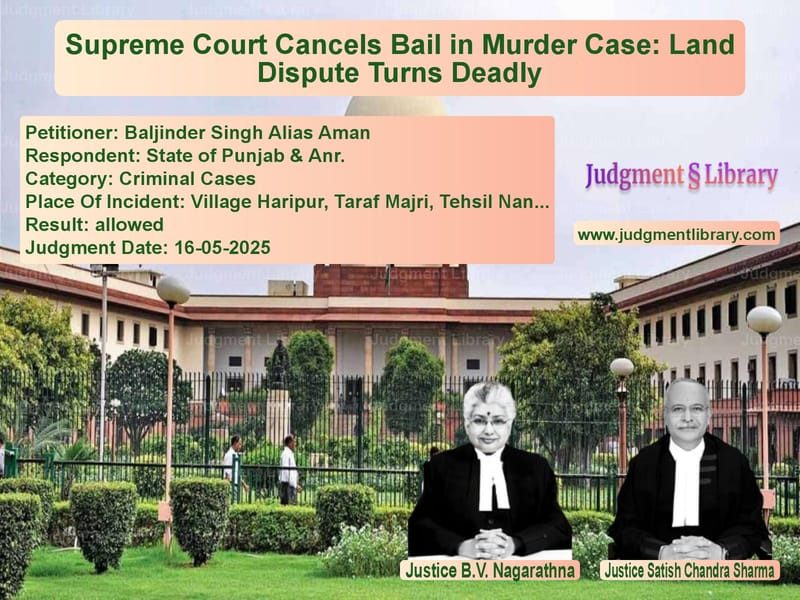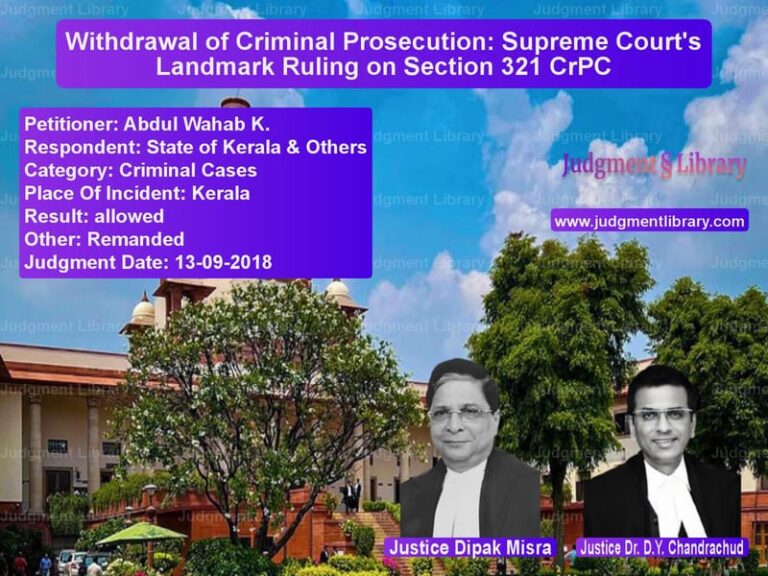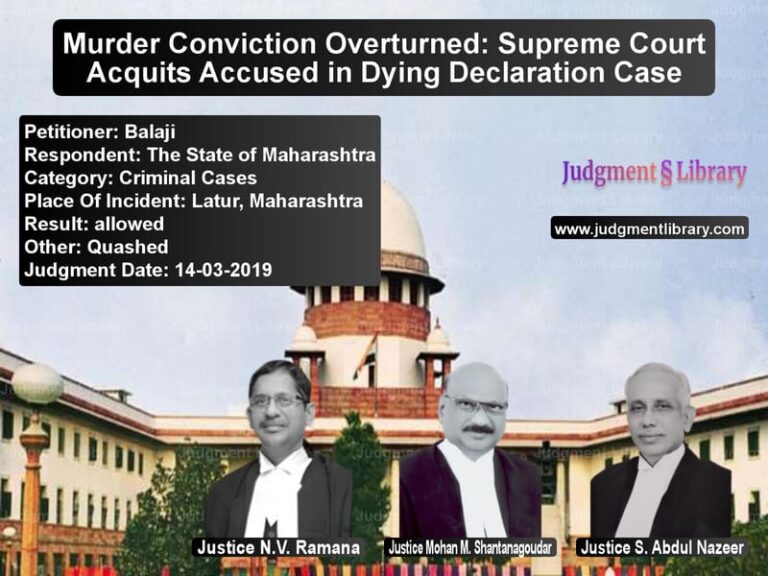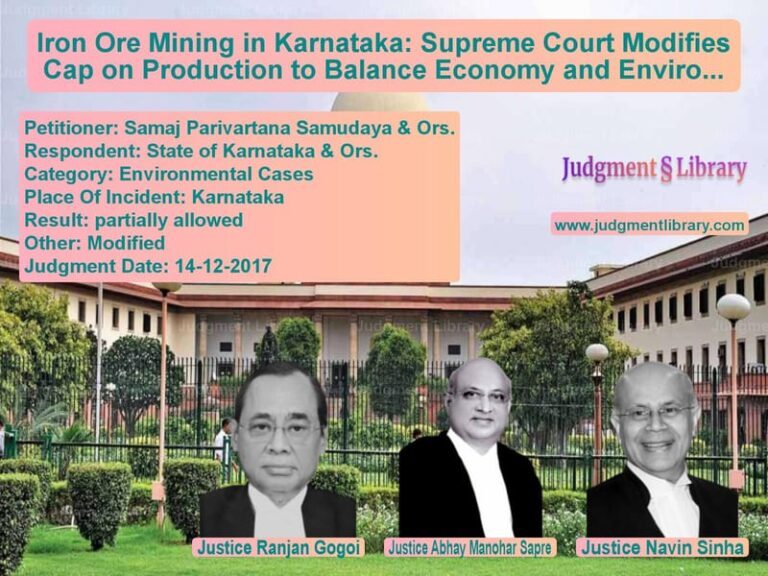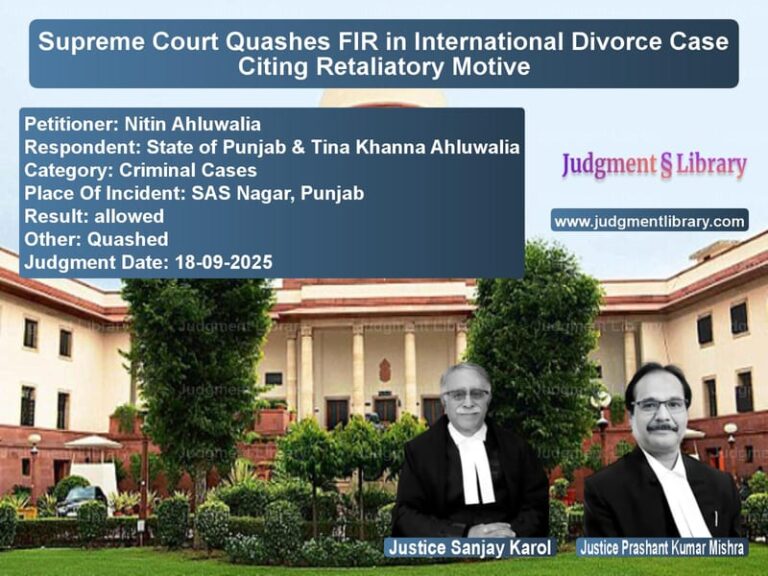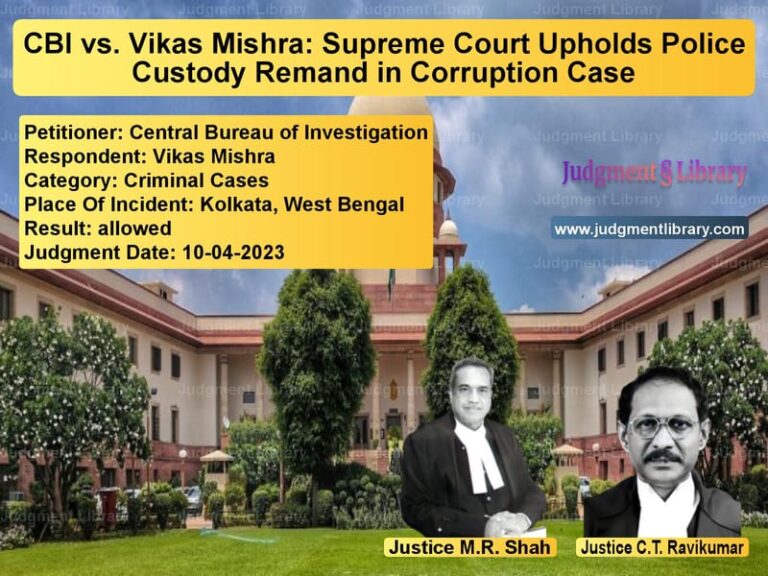Supreme Court Cancels Bail in Murder Case: Land Dispute Turns Deadly
The quiet village of Haripur in Punjab’s Rupnagar district became the setting for a tragic confrontation that would eventually reach the highest court of the land. What began as a property dispute between neighbors escalated into a violent clash that claimed a life and sparked a legal battle over bail, criminal intent, and the proper administration of justice. The case of Baljinder Singh versus the State of Punjab presented the Supreme Court with fundamental questions about when bail should be granted in serious criminal cases and what constitutes adequate judicial reasoning in such matters.
The story unfolded on the night of March 22, 2023, when Baljinder Singh, who operated a crusher business under the name ‘Sat Sahib,’ received a disturbing phone call around 11:30 PM. The caller informed him that Mandeep Singh and Narinder Kumar, along with 7-8 other individuals, had trespassed onto his land in Taraf Majri village and were using abusive language against him. The land in question measured approximately 65 acres, and it abutted property owned by Mandeep Singh. The barbed wire fencing on Baljinder’s property had been dismantled, suggesting forced entry.
Concerned about his property and safety, Baljinder immediately set out for the site with three companions: his driver Anil, Deepak Kumar, and his watchman Bahadur Singh. They traveled in Baljinder’s Land Cruiser vehicle, unaware that the situation would turn fatal. According to Baljinder’s account, when they arrived at the property, the accused rammed their Fortuner vehicle into Baljinder’s car. As Baljinder exited his vehicle, Mandeep Singh allegedly hit Anil with his car, throwing him to the ground. The scene turned more violent as the accused emerged from their vehicle armed with wooden sticks. Mandeep Singh reportedly struck Anil on the head with a wooden stick while Narinder Kumar inflicted injuries on Anil and the other companions. Fearing for his life, Baljinder fled the scene. Later, he discovered that the accused had taken Anil to a hospital, where he was declared dead.
Based on Baljinder’s statement, the police registered FIR No. 30 dated March 22, 2023, under Sections 302 (murder), 323 (voluntarily causing hurt), 148 (rioting armed with deadly weapon), and 149 (unlawful assembly) of the Indian Penal Code at Police Station Nangal in Rupnagar district. Later, Sections 148 and 149 were deleted, and Sections 34 (common intention), 427 (mischief causing damage), and 120B (criminal conspiracy) were added. The respondents were arrested the following day and sent to judicial custody.
The case took several procedural turns that would become significant in the subsequent legal battles. After receiving a complaint from Dev Raj, father of accused Narinder Kumar, the Inspector General of Rupnagar Range transferred the investigation to Ms. Darpan Ahluwalia, IPS, Assistant Superintendent of Police of Dera Bassi subdivision. The police filed a charge sheet on June 20, 2023, and the Judicial Magistrate First Class in Rupnagar took cognizance, committing the case to the Additional Sessions Judge for trial. A supplementary charge sheet followed on October 9, 2023, based on further investigation.
The legal proceedings became complicated when the respondents filed a petition under Section 482 of the Criminal Procedure Code before the Punjab and Haryana High Court, seeking quashing of the charge sheet. On December 15, 2023, the High Court directed the trial court to adjourn proceedings beyond January 9, 2024. Baljinder challenged this order in the Supreme Court through a Special Leave Petition, but it was dismissed on May 13, 2024, with liberty to approach the High Court for early hearing. However, when Baljinder did so, his application was dismissed on July 16, 2024, meaning the interim order restraining the trial court from proceeding with the trial remained in effect.
Meanwhile, the respondents had applied for regular bail before the trial court through separate applications. The Sessions Court rejected both applications on May 21 and May 24, 2024, noting that Mandeep Singh was a habitual offender with eight other criminal cases registered against him. The court also emphasized the gravity of the offenses and the heinous nature of the alleged crime. Undeterred, the respondents approached the High Court again with fresh bail applications, which were heard together as CRM-M-35115/2024 and CRM-M-36312/2024. In a common order dated November 14, 2024, the High Court set aside the trial court’s order and granted bail to both respondents. It was this order that brought the matter before the Supreme Court, with Baljinder Singh challenging the grant of bail.
The Supreme Court bench comprising Justice B.V. Nagarathna and Justice Satish Chandra Sharma heard arguments from all parties. The appellant’s counsel made a two-fold submission before the court. He first drew attention to the impugned order, contending that it lacked proper reasoning for granting bail to the respondents. He specifically pointed out that paragraph 12 of the impugned order only recorded submissions in a cryptic manner, with reasoning given in paragraphs 13 and 14 leading to the grant of bail. The counsel argued that these reasons were erroneous and did not merit the grant of bail.
The appellant’s counsel further submitted that the respondents were alleged to have committed offenses under Section 302 of the IPC, and the manner in which the offense was committed was gruesome, planned, and executed in a way that reflected criminal conspiracy among the accused. He emphasized that the Sessions Court had rightly declined bail, and the respondents had been in jail for one year and eight months. The charge sheet and supplementary charge sheet had been filed, but the trial was stayed due to another proceeding in the High Court. The counsel contended that the respondents had criminal antecedents and were not entitled to bail given the manner in which the deceased was killed. He therefore requested that the impugned order be set aside and the bail cancelled.
The State of Punjab, through its counsel, supported the appellant’s case and requested appropriate orders in the appeals. The counsel for the respondent-accused, however, defended the High Court’s decision. He argued that the High Court had rightly identified reasons why the respondents deserved bail, noting that the accused themselves had carried the deceased to the hospital and ensured he received immediate treatment, which showed lack of criminal intent. He submitted that the High Court had recorded in detail the submissions of the respective parties and reached the right conclusion, so the appeals should be dismissed.
After considering all arguments and examining the material on record, the Supreme Court delivered its judgment. The court noted that the respondents were alleged to have committed offenses under Section 302 of the IPC. While it might be true that the respondents carried the injured victim to the hospital, the court observed that the victim was actually brought dead. This fact had to be considered separately from the question of who committed the offense in the first place. The trial court had rightly noted this aspect and declined bail, but the High Court had set aside that order with very cryptic reasoning while granting bail.
The Supreme Court made several crucial observations in its judgment. The bench stated: “We note that, inter alia, the respondent-accused(s) have been alleged to have committed the offence under Section 302 of the IPC. It may be a fact that the respondent-accused(s) may have carried the injured victim, who later died, to the Hospital but he was actually brought dead to the hospital. This fact will have to be considered de hors from the fact as to who actually had committed the offence in the first place in the instant case. The trial court has rightly noted the said aspect and declined to grant bail. However, the High Court has set aside the said order and in a very cryptic reasoning has granted the relief of bail.”
The court continued: “In the circumstances, we find that the order of the High Court calls for interference and therefore, the same is set aside. Consequently, the order of the Sessions Court is restored.”
Since the respondents had been on bail pursuant to the High Court’s November 14, 2024 order, the Supreme Court directed them to surrender before the jurisdictional magistrate or the concerned police station on or before June 16, 2025, where they would be taken into custody. The court further ordered that if the accused failed to surrender by that date, the police should take steps to arrest both accused. As an interim measure, the court directed the respondents to deposit their passports at Police Station Nangal, Rupnagar, on or before May 19, 2025.
The Supreme Court’s decision highlights several important principles in bail jurisprudence, particularly in cases involving serious offenses like murder. The court emphasized that while subsequent conduct like taking the victim to the hospital might be relevant, it cannot override the gravity of the offense itself, especially when the victim was already dead when brought to the hospital. The judgment also underscores the importance of detailed reasoning in bail orders, particularly when overturning a lower court’s decision in serious criminal matters.
This case also illustrates the complex interplay between different stages of criminal proceedings and how procedural maneuvers can affect the substantive rights of parties. The stay on the trial proceedings while the bail matter was being contested created a peculiar situation where the accused had obtained bail while simultaneously preventing the trial from moving forward. The Supreme Court’s intervention restored the primacy of the trial court’s assessment of the case’s seriousness.
The judgment serves as a reminder that bail in murder cases requires careful consideration of multiple factors, including the nature of the offense, the evidence collected, the conduct of the accused, and their criminal antecedents. The fact that the trial court had noted Mandeep Singh’s status as a habitual offender with eight other criminal cases weighed significantly in the Supreme Court’s assessment that the High Court had erred in granting bail.
For the family of the deceased Anil, the Supreme Court’s decision represents a significant step toward justice. The case continues to proceed through the judicial system, but the cancellation of bail ensures that the accused will remain in custody during the trial, barring any further legal developments. The requirement to surrender passports also prevents the accused from leaving the country while the case is pending.
The legal principles established in this case will likely influence future bail determinations in serious criminal cases across India. The Supreme Court’s insistence on substantive reasoning in bail orders, particularly when dealing with offenses under Section 302 of the IPC, sets an important precedent for lower courts. The judgment reinforces the principle that bail is not a matter of right in serious cases and must be granted only after thorough consideration of all relevant factors.
As the respondents prepare to surrender and return to judicial custody, the focus now shifts to the trial court, where the substantive case will be heard. The stay on trial proceedings ordered by the High Court will need to be addressed, and the evidence carefully examined to determine the guilt or innocence of the accused. For now, the Supreme Court has ensured that the seriousness of the allegations is not overshadowed by procedural technicalities or insufficiently reasoned bail orders.
The case of Baljinder Singh versus State of Punjab thus stands as an important chapter in Indian criminal jurisprudence, emphasizing the judiciary’s role in balancing individual liberty with the demands of justice in serious criminal matters. The Supreme Court’s intervention serves as a corrective measure, ensuring that bail decisions in heinous crimes are made with the gravity and careful reasoning they deserve.
Petitioner Name: Baljinder Singh Alias Aman.Respondent Name: State of Punjab & Anr..Judgment By: Justice B.V. Nagarathna, Justice Satish Chandra Sharma.Place Of Incident: Village Haripur, Taraf Majri, Tehsil Nangal, District Rupnagar, Punjab.Judgment Date: 16-05-2025.Result: allowed.
Don’t miss out on the full details! Download the complete judgment in PDF format below and gain valuable insights instantly!
Download Judgment: baljinder-singh-alia-vs-state-of-punjab-&-an-supreme-court-of-india-judgment-dated-16-05-2025.pdf
Directly Download Judgment: Directly download this Judgment
See all petitions in Murder Cases
See all petitions in Bail and Anticipatory Bail
See all petitions in Attempt to Murder Cases
See all petitions in Criminal Conspiracy
See all petitions in Property Disputes
See all petitions in Judgment by B.V. Nagarathna
See all petitions in Judgment by Satish Chandra Sharma
See all petitions in allowed
See all petitions in supreme court of India judgments May 2025
See all petitions in 2025 judgments
See all posts in Criminal Cases Category
See all allowed petitions in Criminal Cases Category
See all Dismissed petitions in Criminal Cases Category
See all partially allowed petitions in Criminal Cases Category

